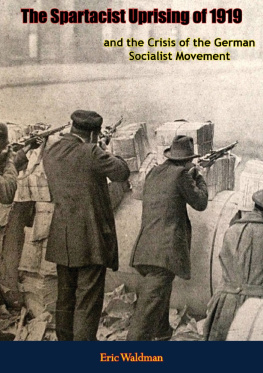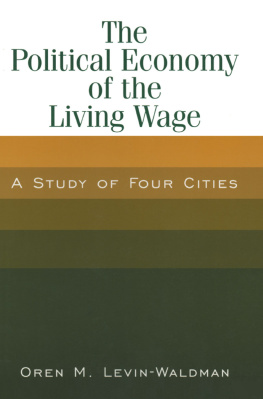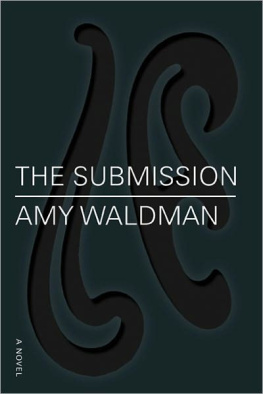Eric Waldman - The Spartacist Uprising of 1919
Here you can read online Eric Waldman - The Spartacist Uprising of 1919 full text of the book (entire story) in english for free. Download pdf and epub, get meaning, cover and reviews about this ebook. year: 2020, publisher: Barakaldo Books, genre: Politics. Description of the work, (preface) as well as reviews are available. Best literature library LitArk.com created for fans of good reading and offers a wide selection of genres:
Romance novel
Science fiction
Adventure
Detective
Science
History
Home and family
Prose
Art
Politics
Computer
Non-fiction
Religion
Business
Children
Humor
Choose a favorite category and find really read worthwhile books. Enjoy immersion in the world of imagination, feel the emotions of the characters or learn something new for yourself, make an fascinating discovery.
- Book:The Spartacist Uprising of 1919
- Author:
- Publisher:Barakaldo Books
- Genre:
- Year:2020
- Rating:3 / 5
- Favourites:Add to favourites
- Your mark:
- 60
- 1
- 2
- 3
- 4
- 5
The Spartacist Uprising of 1919: summary, description and annotation
We offer to read an annotation, description, summary or preface (depends on what the author of the book "The Spartacist Uprising of 1919" wrote himself). If you haven't found the necessary information about the book — write in the comments, we will try to find it.
The Spartacist Uprising of 1919 — read online for free the complete book (whole text) full work
Below is the text of the book, divided by pages. System saving the place of the last page read, allows you to conveniently read the book "The Spartacist Uprising of 1919" online for free, without having to search again every time where you left off. Put a bookmark, and you can go to the page where you finished reading at any time.
Font size:
Interval:
Bookmark:


Barakaldo Books 2020, all rights reserved. No part of this publication may be reproduced, stored in a retrieval system or transmitted by any means, electrical, mechanical or otherwise without the written permission of the copyright holder.
Publishers Note
Although in most cases we have retained the Authors original spelling and grammar to authentically reproduce the work of the Author and the original intent of such material, some additional notes and clarifications have been added for the modern readers benefit.
We have also made every effort to include all maps and illustrations of the original edition the limitations of formatting do not allow of including larger maps, we will upload as many of these maps as possible.
THE SPARTACIST UPRISING OF 1919
BY
ERIC WALDMAN, Ph.D.
Contents
IT IS A well known truism that most books reflect not only the effort of the author but an accumulation of thought and study by many others who have completed research and publication in the same general area of investigation. This book is no exception to the rule, and the author has made extensive use of many excellent studies concerned with German political and historical developments. No effort has been made to repeat descriptive material found elsewhere, although references in the footnotes will direct the reader to more detailed historical studies.
It is impossible to acknowledge our obligations to all of those who have directly or indirectly assisted with the writing of this study. However, the authors intellectual indebtedness to his former teacher, Professor Wolfgang H. Kraus, is of such magnitude that is must be foremost as we acknowledge assistance, advice, and constructive criticism. Many thanks are due to Professor Stefan T. Possony of Georgetown University, Dr. Fritz T. Epstein of the Library of Congress, and Mr. Paul R. Sweet, Chief, German Documents Branch, Historical Division, United States Department of State, who have read the manuscript in its original version and have offered pertinent suggestions for its improvement. Valuable source material in the Library of Congress made it possible that such a study could be carried out within the geographic limits of the United States.
The author is also most grateful to his wife for all she did towards the successful completion of this book. Not only did she type and edit the first draft but her searching questions forced him to present a far clearer presentation than he would otherwise have done. Mrs. Florence Dallin and Dr. Marc Griesbach have earned the authors gratitude for their splendid editorial work. While the author is deeply grateful to these and many others who remain unnamed, the conclusion reached in this book and any interpretations offered are solely the responsibility of the author.
E.W.
Marquette University
Milwaukee 3, Wisconsin
THIS STUDY aims at exploring the crisis of the German socialist movement which grew in intensity from the time of the open split of the Social Democratic Party during the war until its climax in the bloody fighting between the radical left and moderate socialists during the so-called Spartacist Uprising of January 1919. In the course of this primary pursuit, two subsidiary aims are served: an analysis of the relationship existing between the theory and practice of the German Communists during their period of political infancy; and an examination of the impact of the Communists on the course of the German Revolution.
The organization of this study can be summarized as follows: Part I deals with the emergence of the left-wing socialists and Spartacists, the forerunners of the German Communists, prior to the outbreak of the November Revolution of 1918. Part II examines the impact of the November Revolution upon the socialists, and discusses the problems created by the different aims for the revolution held by the various parties and factions of the socialist movement. Part III presents the first major crisis of the German labor movement in the post-World War I period, the Spartacist Uprising. It also deals with the revolution in retrospect, indicating the utilization by present-day German Communists of distorted versions of the revolutionary events of 1918-19 for the sake of contemporary propaganda.
Since the importance of ideological concepts of young revolutionary movements is often underestimated, an effort has been made throughout to relate the political theory of the left-wing socialists and Spartacists (or Communists, as the case may be) to the problems under discussion. It should be remembered that during their early phase almost all revolutionary movements rely heavily on theoretical foundations. The democratic liberal creed was no exception. It is only at a later stage, after consolidation has set in and the revolutionary party or movement acquires maturity, that the pragmatic approach to political problems gains predominance, replacing the earlier ideological guidance and determining party actions.
The translations of German quotations in this study are this writers own. An effort has been made to keep them as close as possible to the original text in order to retain some of the flavor of the period in which they were written. This holds true particularly for newspaper articles and transcripts of speeches. German words and names appearing in this book were hyphenated, when required, according to German syllabication.
The phase of German political history into which this study falls is marked by an abundance of source material. The author, therefore, was faced with the problem of a proper selection of representative sources and an evaluation of the highly subjective accounts which were written for the most part within a few years after the events. It is probably characteristic of highly controversial issues, such as the one under discussion, that they frequently become the subject of many authors who are less interested in a scholarly treatment of the problem than in proving a particular point of view and in justifying the actions and views of their own affiliations. This lack of objectivity even holds true for such recent publications as Ruth Fischers Stalin and German Communism . Convenient historical oversights and incorrect factual premises are some of the means used frequently by these authors. Fortunately the abundant documentary materialssome in specific collections, but most of them widely dispersed in secondary worksobviate the need to rely on these partisan accounts, except where an analysis of these biased views adds to the overall understanding of the events under examination.
Many of the ideological concepts and organizational characteristics of the Spartacists, the forerunners of the German Communists, have their origin in the period which followed the unification of the Lassallean workers organization with the Marxian socialists in 1875. The end product of this fusion was the Social Democratic Party of Germany (SPD). In the decades following the union, the SPD developed into a strong mass party and along with its allied trade unions became a powerful factor in German political life.
During this period, a number of political factions emerged within the SPD. These were an outgrowth of basic disagreements in major political and tactical issues, resulting partly from different interpretations of Marxian doctrines and partly from the conflicting objectives of an organization which regarded itself as a proletarian party in a bourgeois state. The perpetuation of these factions in a period of crisis caused by the outbreak of World War I led eventually to a division of the German labor movement into hostile camps, a situation which persists to the present time.
Next pageFont size:
Interval:
Bookmark:
Similar books «The Spartacist Uprising of 1919»
Look at similar books to The Spartacist Uprising of 1919. We have selected literature similar in name and meaning in the hope of providing readers with more options to find new, interesting, not yet read works.
Discussion, reviews of the book The Spartacist Uprising of 1919 and just readers' own opinions. Leave your comments, write what you think about the work, its meaning or the main characters. Specify what exactly you liked and what you didn't like, and why you think so.









